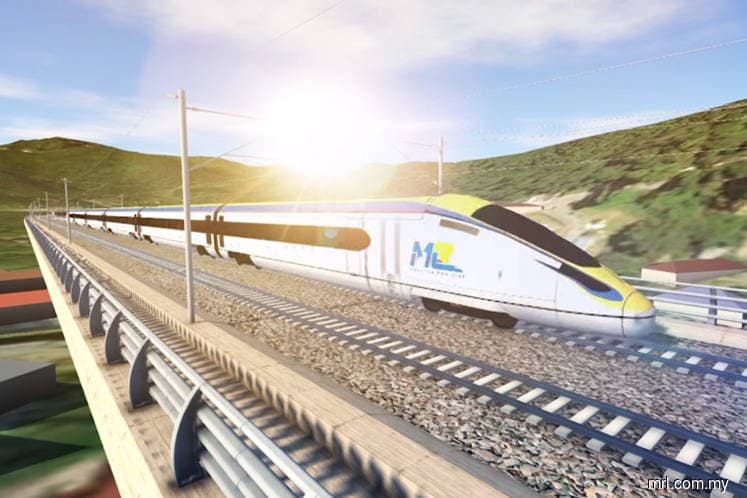
This article first appeared in The Edge Financial Daily on July 4, 2018
KUALA LUMPUR: The total cost to build and finance the controversial China-backed East Coast Rail Link (ECRL) project is a whopping RM81 billion, and that has not even included the cost to run it.
“The final cost of the ECRL project is actually RM81 billion and must be reduced significantly to make it viable financially,” Finance Minister Lim Guan Eng said in a statement yesterday.
The 688.3km rail link, which would pass through a part of Selangor, Pahang, Terengganu and Kelantan, was previously estimated to cost between RM55 billion and as much as RM75 billion.
The minister yesterday broke down the cost of the ECRL project into two portions — RM69.83 billion for development (which includes the basic cost of construction of RM66.78 billion) and RM11.09 billion for financing.
“Indeed the RM81 billion project cost does not include the operating deficit, which cannot be determined for now. Furthermore, the Selangor state government objects strongly to the completion of the Gombak-Port Klang portion of the rail line,” said Guan Eng.
He noted that the ECRL project was first approved by the cabinet on Oct 21, 2016, while the engineering, procurement, construction and commissioning agreement was signed with China Communications Construction Co (CCCC) on Nov 1 of the same year.
“The original project scope was to build a rail line from the Integrated Transport Terminal (ITT) Gombak in Selangor to Wakaf Bharu in Kelantan at a cost of RM46 billion,” said Guan Eng.
On May 3, 2017, the cabinet approved the northern extension of the project from Wakaf Bharu to Pengkalan Kubor in Kelantan for another RM1.28 billion.
Then on May 13, 2017, the previous Barisan Nasional administration signed an additional agreement with CCCC to carry out Phase 2 of the project, which was to extend the line from ITT Gombak to Port Klang for RM9 billion, he added.
On Aug 23, 2017, the cabinet further approved the upgrading of the ECRL to a double-tracking project, which would cost an additional RM10.5 billion.
Guan Eng said to date, Putrajaya, via its wholly-owned operating subsidiary Malaysia Rail Link Sdn Bhd (MRL), has paid CCCC RM19.68 billion, comprising an advance payment of RM10.02 billion and progress payment of RM9.67 billion.
“The advance payment of RM10.02 billion, however, is backed by an advance payment bond of the equivalent amount. This advance payment bond may be redeemed by MRL to recover up to RM10.02 billion,” he explained.
In the worst-case scenario, Guan Eng said, the federal government can only recover RM10.02 billion of the RM19.68 billion paid.
“Based on these facts and figures, as well as the feasibility studies of the project, we expect that the ECRL project will only become financially and economically feasible if there is a drastic price reduction for the project by CCCC,” he added.
Noting the strong objection by the Selangor government towards the ECRL project, especially with respect to the rail link from ITT Gombak to Port Klang, Guan Eng said only after a significant price reduction for the ECRL is obtained will the federal government enter into discussions with the state government on the merits of the ECRL project as compared to the possible Unesco World Heritage Site listing.
Section 20A of the Town and Country Planning Act 1976 states that the federal government needs to consult the state government before carrying out any federal project in the relevant state.
Concerns have been raised after the new ruling coalition Pakatan Harapan’s pledge to review all megaprojects approved by the previous government in a bid to help the country reduce its RM1 trillion debt. So far, casualties include the RM50 billion to RM60 billion Kuala Lumpur-Singapore high-speed rail and the RM45 billion Klang Valley mass rapid transit Line 3.
Malaysia had earlier expressed its intention to renegotiate the ECRL project with its Chinese partners, which Prime Minister Tun Dr Mahathir Mohamad during an interview with The Edge Malaysia weekly on May 28 described the contract as strange.
The premier had pointed out that the money from the RM55 billion loan given out by a Chinese bank (China Exim Bank) for Malaysia to build the ECRL project is being kept abroad, and paid to the Chinese construction company in China.
“This is not the normal way it is done, whereby the loan would have been drawn down in Malaysia and paid to the foreign company’s local subsidiary since the project is in Malaysia,” Dr Mahathir said.
He also noted that the payments to CCCC are not on the basis of work done but according to a predetermined timetable, which is also not normal.